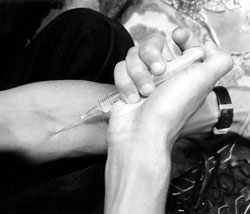|
|
The highest proportion of HIV-infected people in Nepal is among injecting drug users: 70 percent of the estimated 20,000 people using needles.
Injecting drug users share needles and are sexually active, spreading the virus in the general population. That is why it is necessary to reduce the risk of HIV transmission among this group. Anti-drug programs are well and good, but they take time, and relapse rates are high.
However, it is possible to reduce the risk of contracting HIV, hepatitis and other diseases by discouraging needle sharing and to switch them to less harmful oral drugs. Needle exchange programs and methadone clinics are the most common options. While realistic, they are controversial for, some say, making drug use safer rather than encouraging getting clean.
There has been a needle exchange program in Kathmandu since 1992, but it hasn't been very successful. For one, it's run like an office, closed on weekends, holidays, bandhs. Bijay Pandey, project coordinator at the voluntary group, Youth Vision, says: "IV users do not get facilities all the time, and the program also does not cover a wide area, so it isn't very effective."
Instead many addiction specialists recommend pharmacotherapy to reduce risk. Users are encouraged to switch to oral drugs instead of injecting, described by Pandey as "abstinence through substitution".
Patrick O'Gorman of the Asian Harm Reduction Network (AHRN) says it really works. "Drug users do change, but incrementally," he says, "It is impractical to expect them to stop taking drugs overnight." Abstinence is the eventual aim, as patients become less dependent on hard drugs.
A substitution program has been tried in Nepal, but it had a poor conversion rate. Eight years ago, a government initiative provided methadone, used internationally as a substitute for heroin and other injecting drugs. But it failed because other essential components such as counselling, social support and social integration were missing, as was proper monitoring and control.
The Netherlands are pioneers in substitution programs, and Dutch doctor Simon Boerboom says that the public health and other social benefits of a well-run program are considerable. "We must understand that there are some people who cannot do without drugs. Pharmacotherapy helps them as well as society in many ways," he says, "but very close monitoring, evaluation and control are essential."
With HIV infection rates skyrocketing among injecting drug users in Nepal, voluntary groups are now lobbying to have pharmacotherapy legalised, and developing a comprehensive package to promote user safety and reduced dependency. The first step would be to have methadone and buprenorphine, widely used substitution drugs, taken off the restricted list in Nepal.
Both are categorised as essential drugs by the WHO, but it is still illegal to import them here for substitution programs. That could change soon. Pratap Kumar Pathak, joint secretary of the Home Ministry says: "We understand that when prevention is not possible harm reduction is the right option."
Unofficially, the government and UNDP came to an understanding last year to reintroduce substitution drugs. A group of NGOs also signed a letter of solidarity committing to promote users' right to choose and HIV prevention in injecting drug users, among others.



